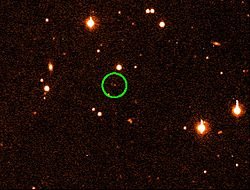
For many years a great number of planets of different forms, composition, some with similar or very different gravitational fields have been discovered, others that are even similar to our planet Earth and others that are at great distance.
But there is one that is more distant and is named Sedna, a dwarf planet that is located in the farthest distance of our solar system. Discovered in 2003 on November 14 by Mike Brown, Chad Trujillo and David RabiNowitz.
But where does the name Sedna come from?
This planet is given this name due to the Inuit goddess of the sea, that according to its legend, the goddess Sedna was mortal, but became immortal after drowning in the Arctic Ocean and, given that this small planet is about 13 billion kilometers away, this makes it the coldest object that is far from the sun, hence the name of Sedna.
In the words of Mike Brown, there is so much distance to this planet that describes it as:
"The sun seems so small from that distance that it could be completely hidden with the head of a pin."
In addition to being at a great distance, we must remember that it is a dwarf planet, that is to say, the diameter of this planet is quite small, approximately has between 1100 and 1800 kilometers in diameter. This small planet is characterized by staying in a space where there is almost a complete void and yet it possesses more luminosity and presents a reddish color more than any other object of the solar system, this is perhaps due to the abundance of hydrocarbons or tolinas on the surface.
Mike Brown also said:
"Sedna will approach the planet Earth in the next years, approximately in 72 years and after that it will return back to its place more distant of the solar system... The last time Sedna was seen so close to the sun was when the planet earth ended its last ice age"

Sedna will undoubtedly be an object of study where it will try to extract as much information as possible from what this small planet represents in the solar system and the universe.


